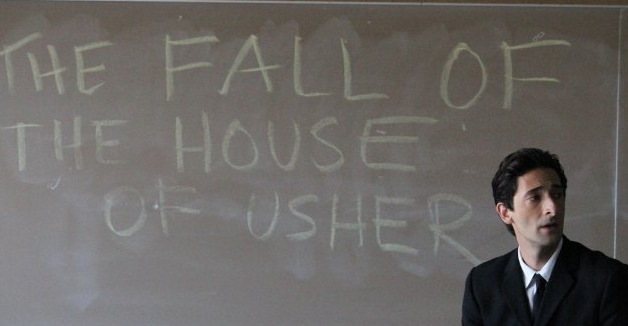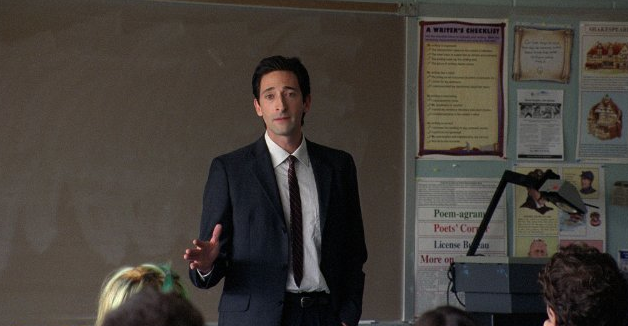Detachment
I disliked Tony Kaye’s Detachment pretty much from the start–it doesn’t help that the filmmaker never stops goading the audience to care, Care, CARE about it. The movie, starring an intensely focused Adrien Brody as a long-suffering substitute teacher, means to be a wrenching, minor-key lament on the plight of education today. I’d call it depression porn.

Brody with Sami Gayle
What constitutes depression porn? For starters, pick a gloomy, one-word title that encompasses everything the main character suffers from (think of Shame, the maddeningly overrated Steve McQueen downer about a pervert with lots of shame).
Then, throw in empty visual metaphors—for emptiness’s sake. Example: at a dying inner-city high school, there are empty hallways, empty classrooms on PTA night—no parents show up—abandoned faculty lounges with desks and leaves and torn books scattered about. This symbolizes the empty futility of modern education.
Make your photography vivid, relentlessly so. We’re talking tight close-ups (often blasted out with glaring sunlight); out-of-focus framing; sepia-toned flashbacks, to the incident that has made your protagonist Detached. Don’t forget the requisite lightning-fast jump-cuts to disturbing images: flayed animals (a sociopathic student mauls a housecat); hypodermic needle injections (a whore gets an HIV test); and drooling/bloody faces of dying people (an ailing grandfather, a suicidal student). Underscore this with a melancholy piano score, to emphasize the importance of it all.
Be sure to explain every symbolic visual gesture in words. A fat, artsy, unpopular girl (a strong Betty Kaye) feels a spiritual connection with the substitute teacher. She photographs him secretly. She can tell he’s sad, deep down, like her. So she makes a collage, wherein he stands, without a face, in front of an empty classroom. Upon seeing it, he remarks: “A faceless man in an empty classroom. Is that how you see me?”
There’s plenty more needless commentary in Detachment, most of it delivered via the protagonist’s superfluous narrative monologues. We get a classroom lecture on the virtues of reading and the perils of an image-obsessed culture (which makes the image-obsessed Kaye something of a hypocrite); we get cobweb-ridden life lessons such as “the world is a confusing place” and “everyone has chaos.” And in case we can’t tell that the entire film is a seething excoriation of the education system, that point gets summed up as well (“we have a responsibility to the young and we’re failing.”)
Brody’s Henry Barthes is detached. At an early age, his mom committed suicide (cue those burnt-red flashbacks) and he was raised by his grandfather, who is now so deep in dementia that he thinks Henry is his daughter. In the most absurdly over-the-top scene, Henry plays along with his grandfather’s hallucination by impersonating his mother.

Marcia Gay-Harden (as the principal)
Kaye takes a similarly overstated, gimmicky approach to the whole film, and in turn he tarnishes several key performances. James Caan (in a marvelous break from form), plays a sarcastic detention monitor who cheerfully presents graphic photos of gonorrhea victims to slutty students. His bravura performance is never allowed to blossom, however, as Kaye never lets scenes play out; he interrupts all of them with the same blistering flashbacks and jarring close-ups.
Carl Lund’s screenplay milks every potential high-school drama stereotype. There’s the standard tough black student that curses Barthes out on his first day; by his last day, the kid has warmed up to him, though the transformation is lazily left off-camera. There’s the hardened yet powerless school authoritarian (Marcia Gay Harden), who can’t protect her school against economic pressures. A guidance counselor (Lucy Liu) loses her composure in front of an apathetic student.
The central tragedy of the film is also clichéd: because of his upbringing, Barthes is drawn to the temporary and therefore detached nature of his job, and hence can’t really connect with anyone. It’s meant to be touching that he finally does find a soul mate in the aforementioned whore (a Liza Minelli-ish Sami Gayle, an undoubtedly eye-grabbing actress), but the character is a cipher: of course, she’s just a lonely child with a heart of gold.
After all the slam-bang editing and overt moralizing and tearful, screaming fits of misery, you feel as if you’re being held at gunpoint in a burn victim ward. The overwrought approach worked for Kaye’s American History X, because the tabloid-type subject matter needed an all-out assault on the senses to be effective, but in exploiting a theme this potentially complex, Kaye’s theatrics leave you less moved than, hm, detached.
Visit our Facebook page for several making-of videos of Detachment.







